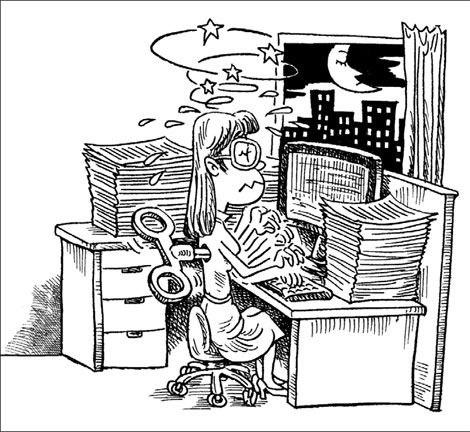Business
Overwork takes its toll on staff health
Updated: 2011-05-30 10:23
By Yang Ning (China Daily)
Many overseas companies blamed for stressful jobs with long hours
BEIJING - Having turned off the office lights at 2 am, Wang Yue wearily trudged home. He and his colleagues spent four days in a row working overtime last week because of an urgent project.
"To be honest, I feel exhausted from overwork. I suffer from various kinds of work-related illness, such as loss of sleep, numbness in the neck and shoulders and neurasthenia (a psychological disorder characterized by chronic fatigue and weakness, loss of memory, and generalized aches and pains)," said Wang, a 29-year-old employee in the marketing department of an international pharmaceutical company in Beijing.
It is true that thousands of millions of Chinese jobseekers dream of landing a well-paid job, like Wang's, with an overseas company. However, the sudden death of a young female worker in mid-April rang loud alarm bells and some of them started to change their minds.
Having been employed in the Shanghai office of PricewaterhouseCoopers (PwC), one of the world's leading accounting firms, for just six month, Pan Jie, a 25-year-old young woman died from acute meningitis. She had just graduated from Shanghai Jiao Tong University with a master's degree last year.
|
||||
Still, the overwhelming majority of people believed Pan's death was caused by overwork because her micro blog was filled with complaints about working overtime, heavy workloads and her deteriorating health before she died.
"Pan's death really gave me a full-on blow. Now, I am starting to think about changing my job," Wang said.
"One of the most important attributes I will look for in a new employer is a less-stressful work environment. High pay undoubtedly matters, but health is worth more than anything," he said.
More than 70 percent of employees said they suffered from overwork and feel under heavy pressure, according to a recent survey conduced by Beijing-based recruitment website zhaopin.com.
Of some 5,000 Chinese employees polled across the country, nearly 45 percent of respondents said they often felt they were suffering during and after work. Forty percent said they easily lost their tempers at the office.
Another report by the Chinese Medical Doctors' Association and the Chinese Hospital Association showed that around 60 percent of white-collar workers in large cities were at risk of work-related stress.
Jennifer Feng, chief human resources expert at online human resources service provider 51job Inc, pointed out that the overwork phenomenon is very common in overseas companies in China and it is very hard to change the system in the short term.
While most university graduates are aware of this situation, they still apply in vast numbers to those companies because of the relatively high starting salary, she said.
Specials

Room at the inn
The Chinese hotel industry experiences a building boom, prompting fears of oversupply.

Pearls of wisdom
Chinese pearl farmers dominate the world market but now want to work smarter, not harder

Truly a super woman
Li Yuchun first came to prominence in 2005 as the Super Girl winner, and since then has become an international star.




